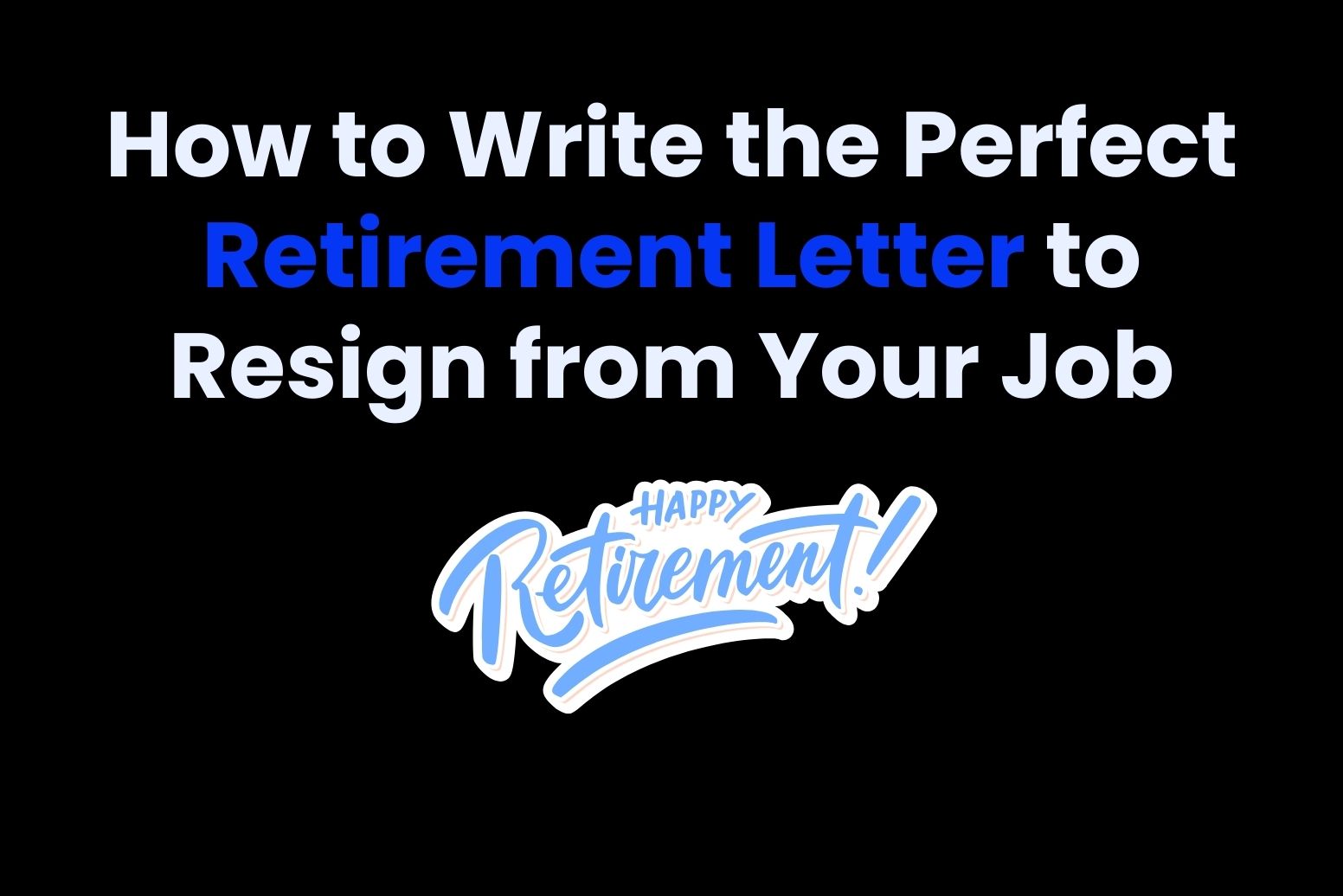If you’ve decided that it’s time to step away from paid work, you need to work on a retirement letter. This is the best way to reveal to your boss that you’re ready to travel the world or spend more time on the golf course.
There are several ways to write and deliver a retirement letter. But it’s a straightforward process that you don’t need to overthink.
In this article, we explain how to structure your letter and what to include. We also provide three examples of retirement letter statements that show the crucial information you need to convey to your boss.
So, if you have your sights set on retirement, read on to find out how to write the perfect letter to your boss to explain your decision.

Is it time to retire?
The average age of retirement is increasing, as people need to work for longer. In the United States, the average retirement age is between 61 and 64 in 2024.
However, you can retire whenever you like. If you’re confident you have enough savings, you don’t need to wait to hit a specific age or a financial milestone.
There’s an entire FIRE movement (Financial Independence Retire Early) encouraging people to save as much as possible to trigger an earlier retirement. If you’re part of the FIRE movement, you might have your sights on retirement at 50 or even 40, rather than your early sixties.
Regardless of when you decide to retire, you need to make preparations. One of these preparations is a letter to your current employer.
In your retirement letter, you need to explain when you plan to retire and, preferably, offer your assistance with finding a replacement. Let’s look more closely at what you should include in such a letter and why it’s necessary.
Why do you need to write a retirement letter?
A retirement letter is the ideal way to inform your manager that you’re resigning from your position due to retirement. Though you can express your retirement verbally to your boss, you will also need to put it in writing so the company has a record of your resignation.
Many people prepare a retirement letter when they get to state pension age. Others have enough savings to retire earlier or to pursue other passions and interests. Equally, you can continue working beyond the standard retirement age if you wish.
Whenever you decide to retire, your retirement letter is a crucial document that you need to get right. The good news is that it’s easy to put together a resignation letter due to retirement. In the sections that follow, we run through how to structure your letter and what details you must include.
How much notice do you need to give?
Most employees give between three and six months’ notice before retiring. However, the earlier you tell your employer, the easier it is for them to replace you.
If you’re in a senior role within the company and have your sights set on retirement a year from now, providing twelve months notice will help with the recruitment and transition process.
You will probably be included in the recruitment process and will help the company identify your replacement.
We also recommend checking your contract before writing your retirement letter. The employment contract might stipulate how much notice you have to give. In this case, ensure you leave sufficient time before your planned retirement date.
How to structure a retirement letter
A retirement letter is a resignation letter. You are resigning from your position within the company to retire from work. This is an exciting time of life. You might be looking forward to more time in the garden, life on the road, or the arrival of your grandchildren.
Whatever your reason for retiring, you need to inform your company at least three months in advance about your planned retirement date. This will give them enough time to find a replacement, as explained above.
You can inform your boss of your decision to retire verbally, but you will need to put it in writing to make it official. With that in mind, here are the details you need to include in your retirement letter:
- Your particulars (address and contact information) and today’s date.
- The name of your manager and company.
- A statement specifying your intention to retire.
- Your proposed last date of work.
- Gratitude for your employment.
- An offer to help find your replacement.
- Closing remarks and your signature.
The crucial section of the retirement letter is the statement and the proposed last date of work. With that in mind, here are a few examples that you can use to get the tone right:
Retirement letter statement example one
Dear [Name],
I am writing to inform you that I will retire from XBP Solutions on October 1st, 2025. I have thoroughly enjoyed my 20 years at the company and would like to express my sincere gratitude for the opportunities I have had during my time here.
In my final six months at XBP, I would like to offer my assistance in finding a replacement. I would gladly help with the recruitment and onboarding process to ensure a smooth transition period for all concerned.
With kind regards,
[Name & Role].
Retirement letter statement example two
Dear [Name],
Please accept this letter as notice of my resignation and retirement from my position as Senior Marketing Executive and ALAM Partners.
Throughout my ten years here, I have thoroughly enjoyed and appreciated the projects I’ve worked on and the friends that I’ve made. I would like to thank you for your support, and I wish you all the best for the future.
My final day at work will be December 30th, 2025. This is twelve months from now. I’m giving you one year’s notice to help you find a suitable replacement and to offer my assistance with any transitionary period.
Yours gratefully,
[Name & Position].
Retirement letter statement example three
Dear [Name],
I am writing to inform you of my retirement date from LFM Capital. On January 1st, 2025, I will retire from my position as Senior Investment Manager.
I have provided six months’ notice to support the recruitment process as the firm seeks a replacement and during that time, I will gladly assist in the hiring and onboarding process, should it be useful.
Please allow me to take this opportunity to to express my sincere gratitude for giving me the opportunity to work at a firm as prestigious as LFM. I have thoroughly enjoyed my career and will look back with fond memories of my time here.
Do let me know if there’s anything I can do during the next six months to help with the next steps.
Kind regards,
[Name & Position].
You can tailor each of these examples to your specific requirements. Remember to run your letter through our AI Grammar Checker before sending it to your boss. This will pick up any typos or grammatical errors to save you from embarrassment when announcing your retirement.
Tips for writing a concise retirement letter

You can use our examples to guide you as you prepare your retirement letter. But if you plan on writing your retirement letter from scratch, here are some tips that will help you include all the necessary information when announcing your decision to leave:
Keep it brief
A retirement letter should be brief and concise. Though you might want to touch on a few of your achievements or personal milestones, it’s not necessary.
The purpose of the letter is to confirm that you’re leaving the company. You don’t need to explain why you’re deciding to retire now or what you hope to do during your retirement.
The retirement letter should simply express that you’re retiring and clearly state your last day in the office. If you want to elaborate, you can provide more details to your colleagues by chatting with them in the workplace.
As for a target word count, aim for between 200 and 300 words for the ideal retirement letter.
Be positive
Even if you’ve been dreaming of retiring for years and can’t wait to leave the office, keep the tone of your letter positive. You should not use this letter as an opportunity to knock your current employer or to express frustration at the workplace.
Equally, don’t look at it as your parting shot at the company. You will gain nothing by expressing negative feelings in your retirement letter, and doing so will make you look bitter.
So, even if you haven’t enjoyed your time working at the company and can’t wait to leave, be positive about the future and thank the company for employing you.
Think carefully about your retirement date
Before writing your retirement letter, be sure to think carefully about your preferred retirement date. Consider if you need to wait to access your pension funds and think about any upcoming projects at work that you might want to be a part of before checking out.
You should also consider any outstanding holiday you have available, as it makes sense to use it up before calling it a day. You should specify your chosen retirement date in your letter, but you can always mention that you’re flexible.
This could be helpful to your boss if there’s a big project coming up and they would like to push your date back a few weeks or months to get the work done.
Offer to help
The best retirement letters clearly indicate an offer of help. If you’ve been working in a role for several years, it’s good manners to offer help in finding a replacement.
Your offer of help could be specific, or it could be more general. For example, you might write, “I’m very happy to help with the recruitment process as you look for a replacement.”
Alternatively, you could simply state, “Should you need any assistance between now and my retirement, please let me know.”
Offering to help is a brilliant way to bring your retirement letter to a close, and it shows that you care about who the company brings in to replace you.
Don’t explain yourself
When writing to your boss, you might initially feel compelled to explain yourself. For example, in the past, you might have explained why you need time off or why you think you’re a good candidate for promotion.
When it comes to your retirement, you don’t need to explain yourself. You have made the decision to retire on your own terms, so don’t feel like you need to tell your boss why.
They’re within their rights to ask you to reconsider, but at this stage, you definitely don’t need to explain yourself. Be confident in your decision and specify that you’ve decided to retire. If necessary, you can continue the conversation in the office or over the phone.
Use AI to help you
If you’re not a particularly confident writer, you can use AI tools like our Email Writer to help you craft a retirement letter. Our tools can do much of the difficult work for you and can provide the ideal template for you to personalize.
So, if you don’t want to use one of our examples above and would like to create something from scratch, prompt our AI tool to write your retirement letter.
What happens if my boss asks me to reconsider?
In most professions, managers don’t want to lose valuable employees. So, if you’ve been doing a good job before you announce your retirement, you will find that your boss asks you to reconsider.
At the very least, your manager might ask you to push back your retirement a few months or even a few years, depending on what projects the company has on the horizon. This is perfectly normal and if anything, it’s a compliment, as it shows how valued you are.
But you need to remember that you’re under no legal obligation to reconsider or push back your retirement. You can retire when you like and on your own terms, so don’t feel pressured by your boss.
Also, if your boss pushes back and asks you to reconsider, it could be a good opportunity to negotiate a pay rise. For instance, you could agree to work in the company for an additional year for an extra 20%. You’ve got nothing to lose at the negotiating table. If they agree, you can do one more year at a higher salary. If they disagree, retire as planned!
Final words: Ready to write your retirement letter?
Writing a retirement letter is easy now you know how. Remember not to overshare, and don’t feel obliged to justify your decision to your boss.
You can retire whenever you like and for whatever reason.
Still, your retirement letter should be polite, considerate, and courteous. You should maintain a positive tone and thank your boss for your time spent with the company.
If you follow the tips introduced above, you won’t encounter any issues when writing your retirement letter to your boss.
Retirement letter FAQ
How do you tell your boss you’re retiring?
The first step is to inform your boss that you’re retiring in an informal conversation. You can do it over coffee or by popping into their office at work. Then, you can write a formal retirement letter, as explained above, to put your intention in writing. You don’t have to tell your boss in advance, but it avoids blindsiding them, and it’s a courteous way of announcing your retirement.
How much notice do you give in a retirement letter?
We recommend giving at least three months’ notice in your retirement letter. Still, the more notice you give, the more time your employer has to find a replacement. If you’re in a senior role at an organization, offering twelve months’ notice could be a smart move, as the recruitment process for your replacement will likely be long.
Do I have to be a specific age before retiring?
No, you can retire at any age. Depending on where you live, you might need to be a specific age before receiving your pension funds. However, if you have enough savings and no longer need to work to support yourself and your family, you can stop working whenever you like.
Can I send a retirement letter via email?
You can send a retirement letter to the company in the post or via email, depending on your preferences. You might even decide to send an email and a hard copy in the mail. Alternatively, you can personally hand the letter to your boss if you prefer. Though an email is perfectly fine in most companies, we recommend submitting a hard copy, too, so the company has it on record.






